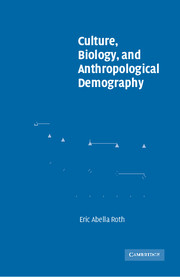Book contents
- Frontmatter
- Contents
- List of Figures
- List of Tables
- Acknowledgments
- 1 Anthropological Demography and Human Evolutionary Ecology
- 2 Reconciling Anthropological Demography and Human Evolutionary Ecology
- 3 Mating Effort and Demographic Strategies
- 4 Demographic Strategies as Parenting Effort
- 5 Future Research Directions
- References Cited
- Index
2 - Reconciling Anthropological Demography and Human Evolutionary Ecology
Published online by Cambridge University Press: 15 December 2009
- Frontmatter
- Contents
- List of Figures
- List of Tables
- Acknowledgments
- 1 Anthropological Demography and Human Evolutionary Ecology
- 2 Reconciling Anthropological Demography and Human Evolutionary Ecology
- 3 Mating Effort and Demographic Strategies
- 4 Demographic Strategies as Parenting Effort
- 5 Future Research Directions
- References Cited
- Index
Summary
Common Ground
Despite their mutual disdain, anthropological demography and human evolutionary ecology share common, though unrecognized, interests. This chapter's goals are to delineate and exemplify common ground between the two perspectives. In contrast to previous texts that constructed coevolutionary frameworks for culture and biology (see Cavalli-Sforza and Feldman 1981; Durham 1991), this chapter has the far more modest objective of simply initiating a dialogue between anthropological demography and human evolutionary ecology. In doing so, it focuses mainly on my work with Rendille pastoralists of northern Kenya.
What do anthropological demography and human evolutionary ecology have in common? Surprisingly, in light of the differences outlined in the previous chapter, I can begin by noting common ground in the very concept of culture. Here evolutionary behavioral ecologists such as Lee Cronk (1999) and cultural anthropologists such as Clifford Geertz (1973) and Roger M. Keesing (1974) are united in proposing that culture is ideational, not behavioral, in nature. In this regard Geertz (1973:144–145) states the following:
one of the most useful ways – but far from the only one – of distinguishing between culture and social systems is to see the former as an ordered system of meaning and symbols, in terms of which social interaction takes place; and to see the latter as the pattern of social interaction itself. … Culture is the fabric of meaning in terms of which humans express their experience and guide their action; social structure is the form that action takes; the actual existing network of social relationship.
- Type
- Chapter
- Information
- Culture, Biology, and Anthropological Demography , pp. 43 - 69Publisher: Cambridge University PressPrint publication year: 2004

